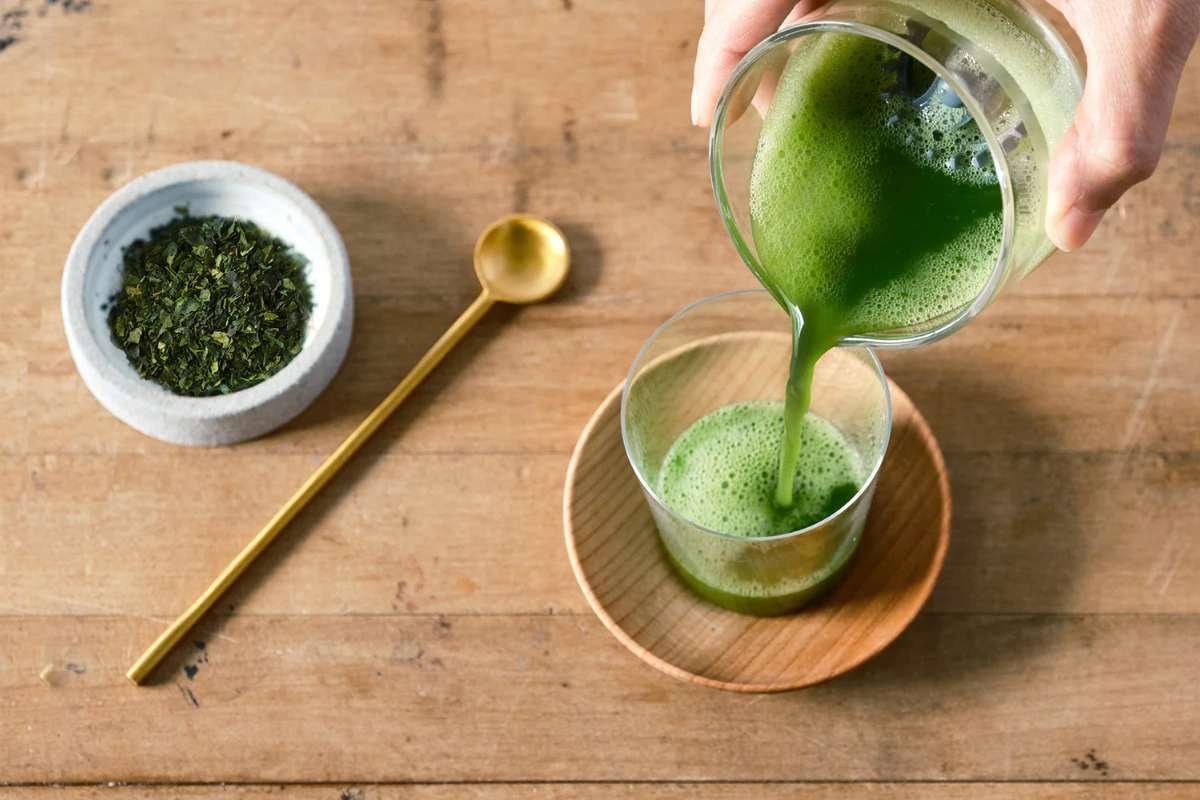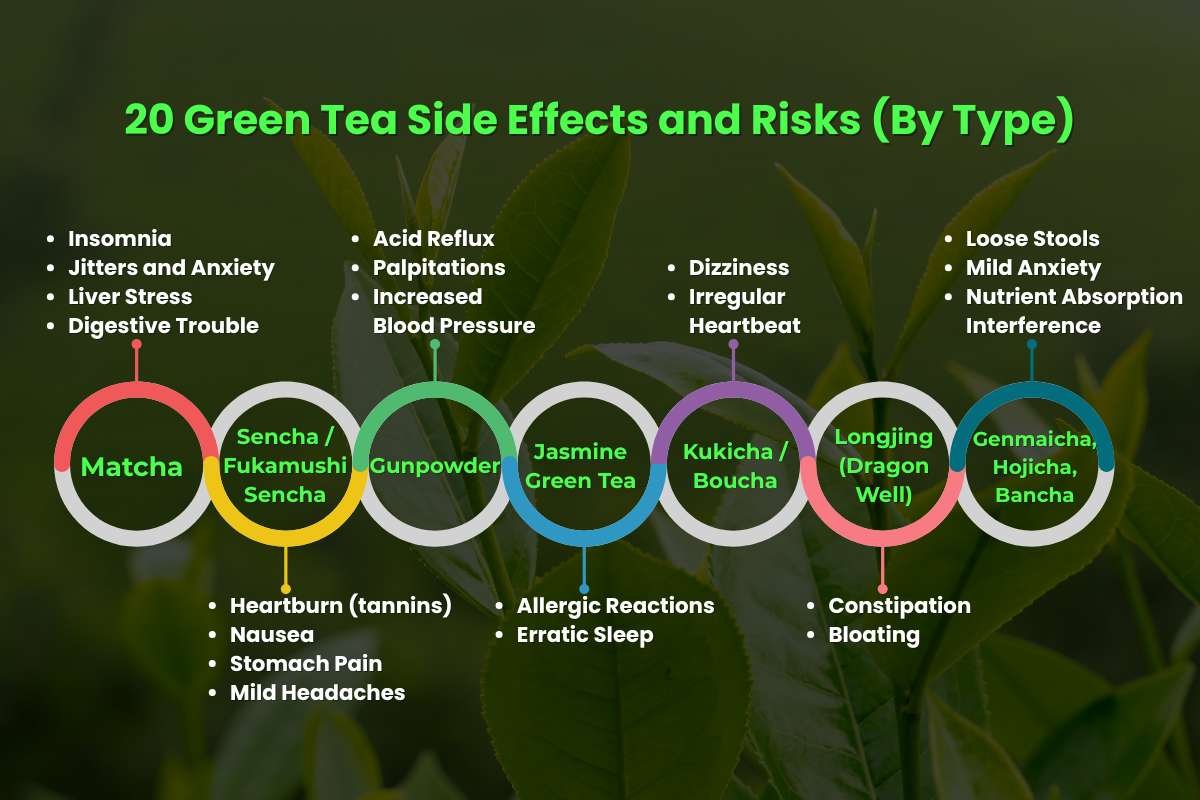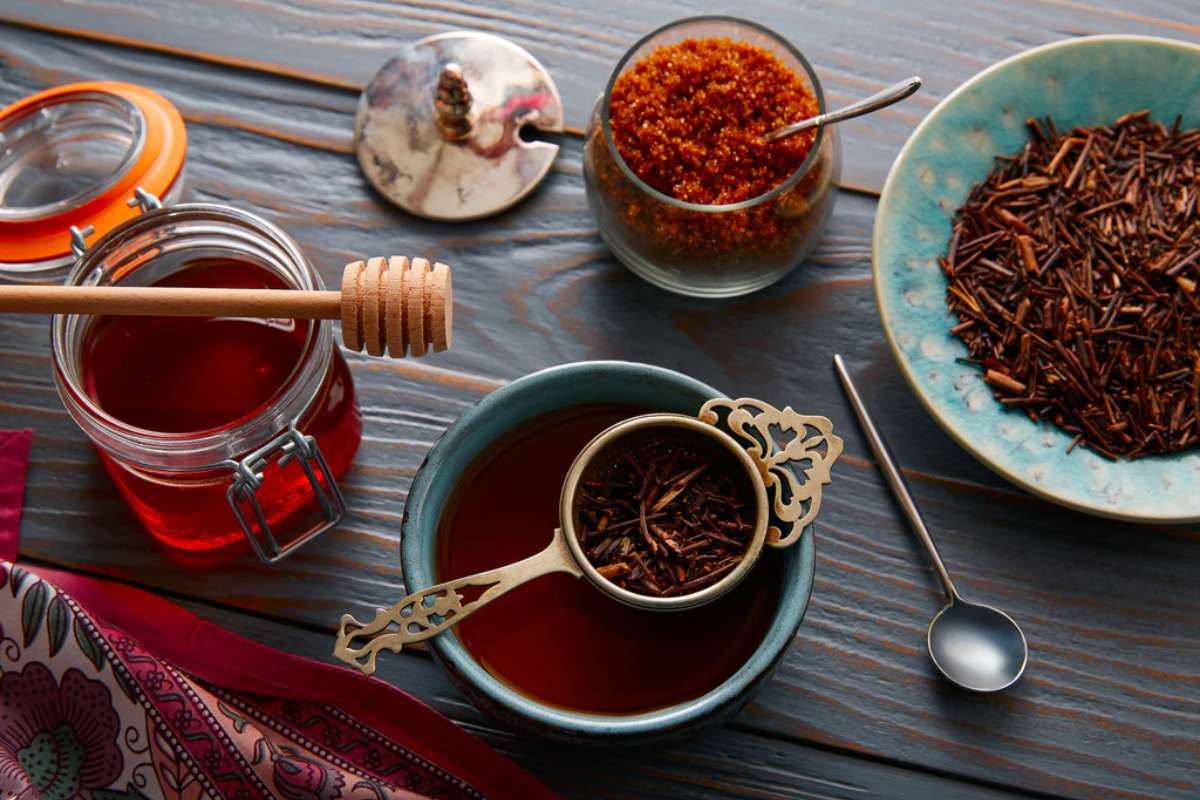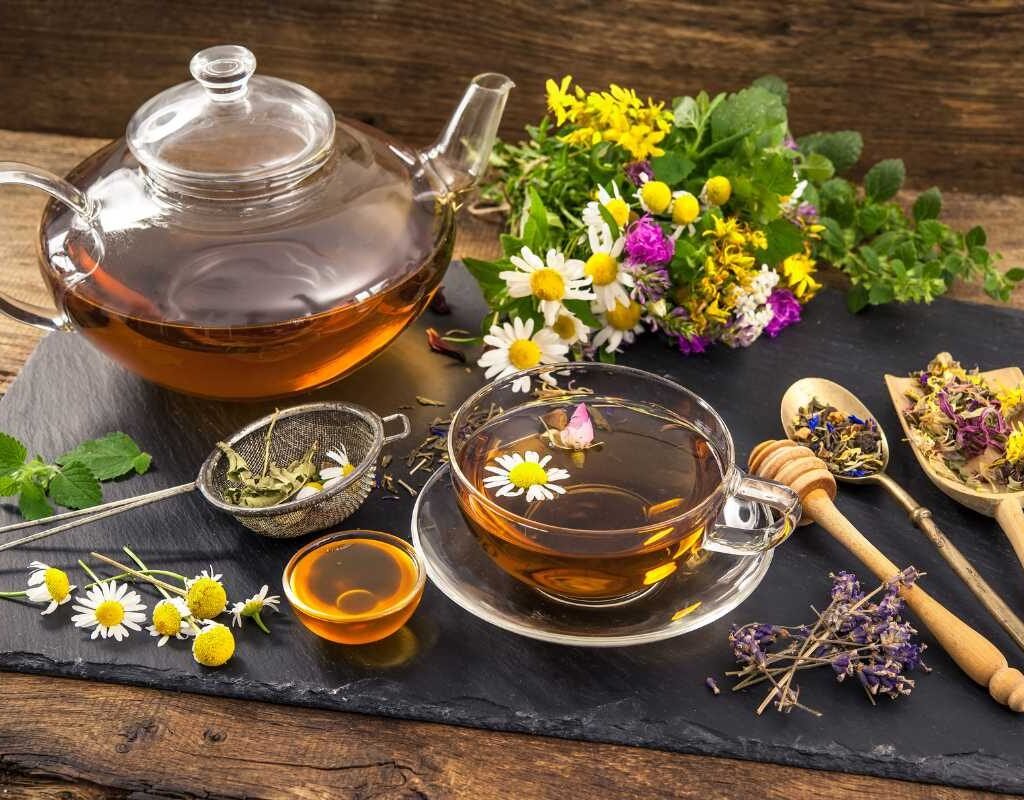20 Green Tea Side Effects You May Already Be Experiencing Without Knowing
Green tea side effects can include digestive issues, headaches, sleep problems, and risks linked to type and intake. Most adults stay safe with three to five cups daily if mindful of health conditions.

- Source: dorothysteas.co.uk
Green tea is loved by many for its health benefits, but it also comes with some surprising effects. It can give you energy, lift your mood, and sometimes even disturb your sleep. These green tea side effects often show up when you least expect them, making each cup a mix of good and tricky surprises. While green tea is known for helping with focus and wellness, it also has its playful side that keeps you guessing. So, as you enjoy your next cup, stay curious and mindful. This simple drink carries both healthy benefits and small challenges in every sip.
What Makes Green Tea Unique?
Green tea is made from the fresh leaves of Camellia sinensis and is revered for minimal oxidation, which preserves its vibrant color and antioxidant content. Unlike black or oolong teas, green tea’s processing skips fermentation, retaining natural polyphenols for a punchy taste and aroma. Its versatility allows for endless flavor profiles and health perks, cementing its spot as a favorite across cultures and centuries.
Types of Green Tea
Here is a detailed explanation of popular green tea types, including unique features, processing techniques, and how individual styles shape aroma, flavor, and green tea side effects.
1. Matcha
Matcha is a fine green powder made from shade-grown leaves. It has a rich, smooth taste and is often used in lattes or ceremonies. Since it has high caffeine and antioxidants, it gives strong energy but may also cause side effects of green tea, like insomnia, restlessness, or stomach upset in sensitive people.
2. Sencha
Sencha is Japan’s most common green tea with a fresh, grassy flavor. It is steamed after harvest to keep its green color and taste. Many people drink it daily, but strong brews or empty stomach consumption may lead to green tea side effects like headaches, nausea, or mild stomach discomfort.
3. Gunpowder
Gunpowder green tea has leaves rolled into tiny pellets that open when brewed. It has a bold, smoky flavor and more caffeine compared to other teas. This makes it energizing but can also trigger side effects of green tea, such as heartburn, acid reflux, or jitteriness if consumed too much.
4. Jasmine Green Tea
Jasmine tea is made by blending green tea leaves with jasmine blossoms, giving it a floral aroma and smooth taste. It feels calming and refreshing, but sensitive people may notice green tea side effects, such as allergic reactions, mild anxiety, or disturbed sleep, if they drink it in excess.
5. Kukicha / Boucha
Kukicha is made from twigs and stems of the tea plant. It has a light, nutty flavor and very little caffeine, making it gentle and safe for most people. While rare, too much can still cause side effects of green tea, like dizziness, irregular heartbeat, or digestive problems, in very sensitive drinkers.
6. Longjing (Dragon Well)
Longjing is a famous Chinese tea with flat leaves, a chestnut-like aroma, and a smooth, slightly sweet taste. It is hand-roasted for quality and packed with antioxidants. Still, drinking strong brews can cause green tea side effects such as bloating, constipation, or stomach discomfort due to high tannin levels.
7. Genmaicha
Genmaicha mixes green tea with roasted brown rice, creating a nutty, toasty flavor. It has less caffeine, making it easier on the stomach and good for everyday use. However, drinking it too often may lead to side effects of green tea, like loose stools, mild anxiety, or nutrient absorption issues.
8. Hojicha
Hojicha is made by roasting tea leaves, giving it a smoky, earthy taste and lower caffeine content. It’s often enjoyed in the evening because it’s gentle and relaxing. Though rare, drinking hojicha very hot or in large amounts may still cause green tea side effects such as indigestion or mild stomach irritation.
9. Tencha and Bancha

Connection to Green Tea Side Effects
Each type’s unique leaf processing, caffeine level, polyphenol concentration, and brewing style contribute to specific green tea side effects. Stronger teas (matcha, gunpowder, sencha) pack more caffeine and antioxidants, increasing the risk of nervousness, insomnia, or digestive trouble. Milder types (kukicha, hojicha, genmaicha) bear fewer risks but still may affect sensitive individuals. Blended and scented teas (jasmine, genmaicha) add flavor but raise potential for allergies or tummy trouble. Always choose a type and brew strength matched to lifestyle and sensitivity for best results.
Chemical Makeup of Green Tea
Green tea’s chemistry is a complex blend of antioxidants, polyphenols, flavonoids, and amino acids. The main stars are catechins, especially EGCG (epigallocatechin gallate), which fight free radicals and may support heart health. Other compounds include:
- Caffeine (stimulates alertness, may trigger certain green tea side effects if sensitive)
- Theanine (relaxing effects)
- Flavonoids and phenolic acids (antioxidant boost)
- Tannins (can upset stomach if brewed strongly)
- Vitamins B, C, E
- Trace minerals like manganese and zinc
Approximately one-third of green tea is polyphenols, a group that includes catechins, flavonoids, and glycosides, vital for its taste and the body’s antioxidant defenses. Brewing method and tea variety can alter the chemical profile, affecting both the benefits and side effects of green tea.
Green Tea Production Process
Green tea production begins by hand-selecting the youngest and freshest leaves, usually during a flush (the spring or summer growth spurt). Steps include:
- Harvest: Picking young leaves and buds by hand for premium quality.
- Steaming/Pan-drying: Leaves are heated to stop oxidation, keeping them green and fresh.
- Rolling: The leaves are kneaded or machine-rolled to break cell walls and shape the tea.
- Oxidation: Minimal oxidation is the secret to green tea compared to black teas.
- Drying: Leaves are dried by pan-frying or oven baking to lock in flavor and aroma without burning.
- Packaging: Finished tea is packed and stored in lightproof containers to retain freshness.
Every part of the process shapes your experience with green tea side effects, from caffeine levels to antioxidant content.
20 Green Tea Side Effects and Risks (By Type)
Here’s a detailed explanation of 20 side effects of green tea and Risks categorized by tea type, including the science behind each risk and practical context.

Matcha
1. Insomnia (due to higher caffeine):
Matcha contains more caffeine than regular green tea because the entire leaf is consumed in powdered form. A single serving already provides a strong energy boost. If you drink it late in the day or have multiple servings, the caffeine can disturb your body’s natural sleep cycle. Many people report lying awake or having restless nights after overdoing it. Those sensitive to stimulants should avoid matcha before bedtime to reduce this Green Tea Side Effect.
2. Jitters and Anxiety:
Matcha delivers a concentrated caffeine kick. While this may help you stay focused, it can also overstimulate your nervous system when consumed in excess. Some people feel shaky, restless, or unusually irritable after drinking several cups. Pairing matcha with coffee or energy drinks makes these reactions stronger. Those already dealing with anxiety or stress may notice worsening symptoms, as high caffeine intake can trigger nervousness and mood changes. Moderation is the key to avoiding this Green Tea Side Effect.
3. Liver Stress (from excessive powder consumption):
Though rare, drinking too much matcha or taking concentrated green tea extracts has been linked in medical reports to liver issues. Since the whole leaf is ingested, the body must process higher levels of catechins and caffeine. Excessive amounts may strain the liver, raising enzyme levels or, in extreme cases, leading to liver injury. These problems usually appear in people who consume well above the recommended servings. Sticking to one or two moderate cups daily minimizes this Green Tea Side Effect.
4. Digestive Trouble:
Matcha is rich in tannins and caffeine, both of which can irritate the stomach lining. Drinking it on an empty stomach may lead to nausea, cramps, or even diarrhea in some people. Brewing it with boiling water also intensifies bitterness, making the tea harsher on digestion. Sensitive drinkers often feel relief by pairing matcha with light food or using slightly cooler water during preparation. Understanding these small adjustments can reduce stomach issues and help avoid this Green Tea Side Effect.
Sencha / Fukamushi Sencha
5. Heartburn (tannins):
Sencha is full of tannins, natural compounds that increase stomach acid. While this creates its characteristic grassy flavor, it can irritate the digestive system. Drinking strong brews or having sencha without food often leads to heartburn or acid reflux. People with sensitive stomachs may feel a burning sensation in the chest or throat soon after drinking. Choosing lighter brews or enjoying them alongside a meal can reduce the discomfort and lower the chances of this Green Tea Side Effect.
6. Nausea:
A common Green Tea Side Effect from sencha is nausea, especially when taken on an empty stomach. The combination of tannins and caffeine can unsettle digestion, causing queasiness within minutes of drinking. Strongly brewed sencha increases this risk, as bitterness irritates the gut lining. Some people also feel dizzy or lightheaded if they sip it without eating first. To prevent this, brew with cooler water, make a lighter tea, and pair it with a small snack for gentler results.
7. Stomach Pain (if brewed strongly or drunk on an empty stomach):
Sencha can cause stomach cramps when brewed too strongly or consumed in large amounts. The acidic nature of tannins can inflame the stomach lining, particularly in sensitive drinkers. If you often experience discomfort, you may be brewing it too hot or drinking too much in one sitting. Empty stomach consumption also worsens the effect. Adjusting steeping times and water temperature, or choosing a milder tea variety, can make a big difference in avoiding this Green Tea Side Effect.
8. Mild Headaches:
Although sencha has less caffeine than matcha, frequent cups can still trigger headaches in those sensitive to stimulants. Drinking more than three cups daily or pairing it with other caffeinated drinks may cause tension headaches or mild migraines. These usually pass once caffeine levels drop, but recurring headaches suggest overconsumption. Switching to weaker brews or limiting cups per day helps. Drinking enough water alongside sencha also lowers this Green Tea Side Effect by balancing hydration levels in the body.
Gunpowder
9. Acid Reflux (high theophylline):
Gunpowder tea has tightly rolled leaves that release a stronger brew. It contains higher levels of theophylline, a compound that increases stomach acid. For people with reflux or sensitive digestion, this can cause burning sensations, sour burps, or indigestion. The bold, smoky flavor often means people brew it strong, further aggravating symptoms. To manage this Green Tea Side Effect, try using cooler water and shorter steep times. Avoiding it on an empty stomach can also help reduce reflux problems.
10. Palpitations:
The combination of caffeine and theophylline in gunpowder tea can overstimulate the heart. Sensitive individuals may feel a racing pulse, fluttering sensations, or irregular beats after drinking too much. Those with existing heart conditions are at greater risk. Even healthy drinkers may notice their heart pounding if they consume large amounts quickly. This Green Tea Side Effect can feel alarming, but limiting intake to one or two moderate cups usually keeps caffeine within safe limits for most people.
11. Increased Blood Pressure (strong brew):
Gunpowder tea’s bold flavor often tempts drinkers to brew it strong. Doing so increases caffeine concentration, which can raise blood pressure temporarily. While healthy individuals may not notice, people with hypertension or cardiovascular risks should be cautious. Drinking multiple strong cups daily may cause sustained pressure spikes. To lower this Green Tea Side Effect, brew lighter infusions, limit total cups, and avoid drinking it close to stressful activities. This makes gunpowder tea safer for regular enjoyment.
Jasmine Green Tea
12. Allergic Reactions (to jasmine):
Some people are sensitive to jasmine blossoms, which are often layered with green tea leaves for fragrance. Allergic responses may include sneezing, a runny nose, itchy skin, or, in rare cases, breathing difficulty. Those with pollen allergies are more prone to this Green Tea Side Effect. Reactions vary from mild discomfort to serious irritation, depending on individual sensitivity. Choosing plain green tea without jasmine is the safest solution for allergy sufferers. Always test with small amounts if you are unsure.
13. Erratic Sleep:
Jasmine green tea contains caffeine, though in smaller amounts than matcha or gunpowder. Combined with the floral aroma, which can act as a mild stimulant, it may still disrupt sleep cycles. Drinking it late in the evening or in high amounts may cause restlessness, difficulty falling asleep, or waking up at night. Sensitive people are more likely to notice this Green Tea Side Effect. Enjoying jasmine tea earlier in the day or switching to decaf versions can reduce sleep problems.
Kukicha / Boucha

14. Dizziness (for those sensitive despite low caffeine):
Kukicha, or twig tea, has very low caffeine compared to other green teas. Still, drinking too much may make very sensitive individuals feel lightheaded or dizzy. This can happen if multiple cups are consumed quickly or without food. Dehydration can also make dizziness worse. While rare, this Green Tea Side Effect is possible for people with low caffeine tolerance. Staying hydrated and drinking kukicha in moderation helps reduce these unpleasant feelings without giving up the tea’s gentle taste.
15. Irregular Heartbeat (if consumed excessively):
Kukicha contains little caffeine, extremely high intake can still trigger irregular heartbeat in sensitive individuals. Overconsumption may overstimulate the body’s nervous system, especially if combined with other stimulants. Symptoms include fluttering, skipped beats, or mild chest discomfort. While uncommon, this Green Tea Side Effect highlights that even low-caffeine teas should be enjoyed moderately. People with heart conditions should drink kukicha in small amounts and monitor how their body responds to avoid unnecessary risks while still enjoying the tea.
Longjing (Dragon Well)
16) Constipation (heavy tannins):
Longjing, also known as Dragon Well, is prized for its delicate flavor but contains high tannin levels. Tannins can slow digestion and harden stool, especially when the tea is brewed strongly or consumed in excess. People who already struggle with digestion may feel more discomfort. Drinking plenty of water alongside Longjing or enjoying lighter brews can reduce this Green Tea Side Effect. Balancing tea intake with fiber-rich foods also helps prevent constipation while still enjoying this world-famous tea.
17. Bloating:
Strong brews of Longjing can sometimes trap gas in the stomach, leading to a bloated or heavy feeling. Drinking it on an empty stomach or alongside protein-heavy meals may make this worse. Bloating is usually mild but uncomfortable. Sensitive drinkers may notice pressure or fullness after just a couple of cups. To minimize this Green Tea Side Effect, avoid brewing it too strongly and try sipping after lighter meals. Staying active afterward also helps reduce bloating naturally.
Genmaicha, Hojicha, Bancha
18. Loose Stools (roasted ingredients):
Genmaicha combines tea leaves with roasted rice, while Hojicha and Bancha use mature leaves. Their roasted or coarse qualities may act like a mild laxative when consumed in large amounts. This can lead to diarrhea, urgency, or loose stools in sensitive people. While occasional, it can be uncomfortable during daily routines. To avoid this Green Tea Side Effect, keep servings moderate, avoid very strong brews, and pair them with food. These teas are still gentle choices compared to stronger ones.
19. Mild Anxiety:
These teas are lower in caffeine; consuming many cups alongside coffee or sodas can cause mild anxiety. Symptoms include nervousness, restlessness, or trouble concentrating. Sensitive individuals may notice their mind racing or heart rate increasing. Even though these teas are considered mild, overconsumption can add up. This Green Tea Side Effect is easy to manage by limiting daily intake to two or three cups and avoiding mixing with other caffeinated drinks. Balance keeps these teas enjoyable.
20. Nutrient Absorption Interference (tannins block iron):
Tannins in Genmaicha, Hojicha, and Bancha can bind with iron from food, reducing how much the body absorbs. Over time, heavy tea drinkers may risk iron deficiency, particularly vegetarians, children, and pregnant women. This Green Tea Side Effect is more likely when tea is taken with meals instead of between them. To reduce risk, avoid drinking these teas during iron-rich meals. Spacing out tea and food keeps both the health benefits and your nutrient levels in balance.
Safety Advice
Most of these green tea side effects occur only with excessive consumption, strong brews, or in those with underlying health sensitivities. For most people, two to three moderate cups daily poses little risk, but individuals with heart, digestive, or iron-absorption issues should be cautious and consult their healthcare provider.
Risks by Category
- Pregnancy/Breastfeeding: Excessive caffeine may affect fetal development or sleep patterns in breastfeeding infants.
- Liver: High doses or extracts can cause liver stress and, rarely, liver damage.
- Diabetes: May interact with medication, altering blood sugar response.
- Iron Deficiency: Tannins inhibit iron absorption.
- Medications: Interactions with blood pressure or lipid drugs may occur.
- Children: Safety not established, avoid giving green tea to under-18s.
- Sensitive Individuals: Caffeine side effects can strike at low doses.
These green tea side effects vary based on leaf type, brewing intensity, and your body’s sensitivity.
Is Green Tea Safe? Dosage Table by Age
Green tea is generally safe for healthy adults, but dosage matters for minimizing green tea side effects. Here’s how much to take:
| Age Group | Cups/Day (240mL each) | Notes/Advice |
| 18-64 Adult | 3-5 | Safe zone, minimal green tea side effects for most. Adjust if sensitive |
| 65+ Senior | 2-3 | Lower caffeine intake recommended for sleep, heart |
| Pregnant/Breastfeeding | 1-2 | Consult a doctor; keep caffeine under 200mg/day |
| 12-18 Adolescent | 0-1 | Not recommended due to a lack of safety studies |
| Children (<12) | 0 | Not advised due to unpredictable green tea side effects |
Facts and Source Links
- Green Tea Side Effects include digestive issues, headaches, and sleep disturbances, mainly due to caffeine and tannins.
- Most adults tolerate up to five cups a day safely; extracts at high doses raise the risk for liver stress.
- Catechins, the main antioxidants in green tea, can both aid health and, in excess, cause rare side effects.
- Production steps, harvest, steaming, rolling, drying, make green tea fresh and potent.
- Children, pregnant women, and those on certain medications should consult a doctor before regular green tea intake.
Conclusion
Remember the superpower mug from the intro? Green tea keeps its hero status with a punch of antioxidants, flavor, and mood-brightening moments, but its alter ego brings 20 green tea side effects that deserve respect. Enjoy the perks, laugh at the quirks, and treat every sip as a choice toward well-being. When mindful, green tea side effects become part of the adventure, not the villain. Sip safe, stay empowered, and let green tea add flavorful wisdom to every day.
